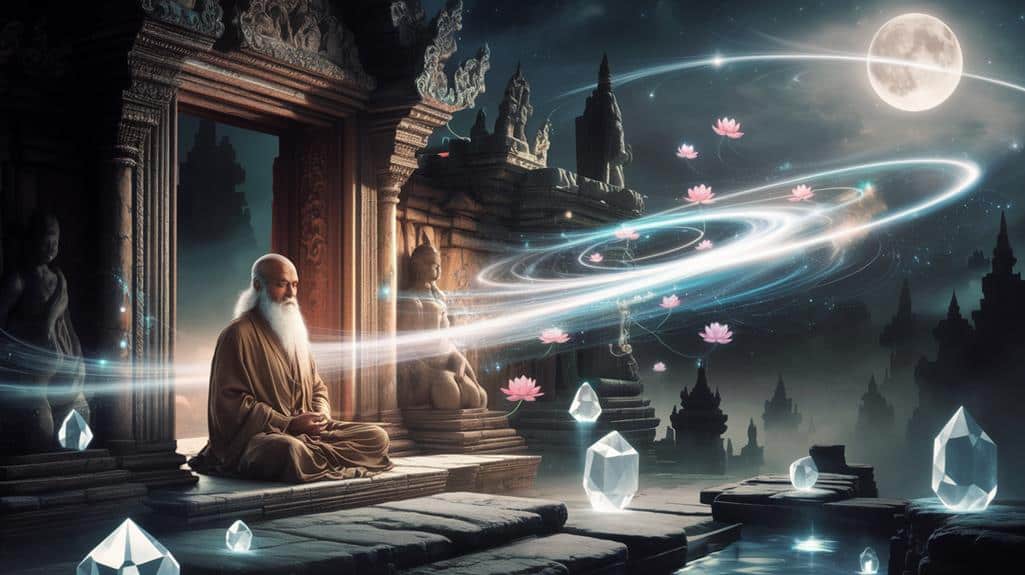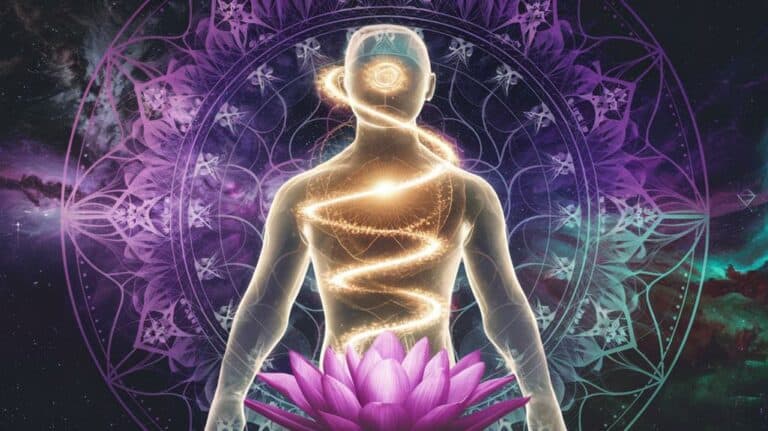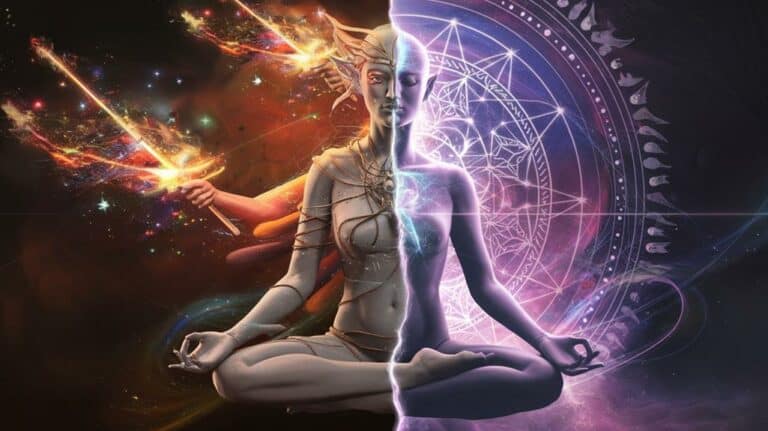The Role of Celibacy in Mystical Traditions
You’ll find that celibacy’s role in mystical traditions extends far beyond simple abstinence – it represents a profound gateway to spiritual transformation that has captivated seekers for millennia. As you explore this ancient practice, you’ll discover how both Eastern and Western traditions view sexual energy as a powerful force that can either be channeled outward for procreation or inward for enlightenment. From Taoist masters to Christian monastics, spiritual adepts have long maintained that the discipline of celibacy unveils hidden dimensions of consciousness and divine connection, though the methods and philosophies behind this practice reveal intriguing contrasts worth examining further.
Ancient Origins of Sacred Celibacy

Tracing the roots of sacred celibacy reveals its emergence across multiple ancient civilizations, from Hindu ascetics to Vestal Virgins in Rome. You’ll find that these early practitioners viewed sexual abstinence as a gateway to heightened spiritual awareness, believing that conserving essential energy could release deeper mystical experiences and divine connection.
When you explore the historical records, you’ll discover that ancient celibates often held revered positions in their societies. In Egypt’s temples, certain priests maintained strict celibacy to preserve their ritual purity, while in Greece, the Oracle at Delphi remained sexually abstinent to maintain her prophetic abilities.
You’re witnessing, through these examples, how the practice transcended mere physical restraint to become a transformative spiritual discipline.
The ancient origins of sacred celibacy weren’t just about restriction – they represented a conscious choice to redirect life force toward spiritual awakening. You’ll notice how these early practitioners developed sophisticated systems of meditation, breathing techniques, and energy work to transmute sexual energy into spiritual power, establishing practices that would influence mystical traditions for millennia to come.
Eastern Mystical Celibacy Practices
Within Eastern spiritual traditions, celibacy practices have evolved into sophisticated systems of energy cultivation and spiritual transformation. You’ll find that practitioners view sexual energy as a powerful force that can be redirected inward for spiritual awakening, particularly in traditions like Tantra and Taoism.
This transmutation of essential energy, known as “ojas” in yogic traditions or “jing” in Chinese practices, becomes your gateway to heightened states of consciousness.
In Buddhist monasticism, you’re taught that celibacy isn’t merely about abstinence – it’s a doorway to breaking free from attachment and desire. When you practice brahmacharya (spiritual celibacy) in the Hindu tradition, you’re engaging with an ancient system that views sexual restraint as a means of conserving life force.
The practice isn’t about denial; it’s about channeling your essential energy toward spiritual elevation.
You’ll discover that Eastern celibacy practices often incorporate sophisticated breathing techniques, meditation, and energy work. These methods help you transform raw sexual energy into spiritual power, leading to what practitioners describe as expanded consciousness and deeper connection with divine reality.
Western Religious Celibate Traditions

Western celibate traditions emerge mainly from Christian monasticism, where you’ll find practices dating back to the desert fathers of the 3rd and 4th centuries. In these ancient practices, you’ll discover how celibacy wasn’t merely about abstaining from physical relations, but rather served as a gateway to deeper spiritual communion.
You’ll notice how monks and nuns embraced this path as a means of channeling their life force toward divine contemplation.
If you explore medieval Christian mysticism, you’ll encounter figures like Teresa of Ávila and John of the Cross, who viewed celibacy as an essential component of their mystical journey. They understood that by redirecting sexual energy, you’re able to cultivate a more profound connection with the divine.
This tradition continues in modern Western monasticism, where you’ll find communities still dedicated to this transformative practice.
You’ll see how Western celibate traditions differ from their Eastern counterparts in their emphasis on complete renunciation rather than transmutation. While both paths lead to spiritual elevation, Western traditions tend to focus on the soul’s direct relationship with God, viewing celibacy as a sacred offering rather than an energetic practice.
Energy Transmutation Through Celibacy
The concept of energy transmutation stands in stark contrast to the complete renunciation found in Western traditions. Instead of viewing sexual energy as something to suppress or deny, Eastern mystical paths often see it as a powerful force you can redirect toward spiritual awakening.
You’ll find this understanding deeply embedded in practices like Tantra and Taoist inner alchemy, where practitioners learn to channel essential life force upward through the subtle body’s energy centers.
When you practice conscious celibacy with this understanding, you’re not fighting against your nature but rather working with profound biological and spiritual forces. Through specific breathing techniques and meditation practices, you’ll discover how to transmute what might otherwise be expressed sexually into creative, healing, or transcendent energy.
This process isn’t about resistance – it’s about transformation. You’re learning to direct this potent force toward higher consciousness, much like redirecting a river’s flow to nourish new ground.
The key lies in understanding that sexual energy represents your fundamental creative force, and when you consciously choose to redirect it, you’re participating in an ancient alchemical process that can fuel spiritual evolution and profound inner transformation.
Modern Perspectives on Spiritual Celibacy

Modern views on spiritual celibacy reflect a complex intersection between traditional wisdom and contemporary understanding of human psychology and neuroscience. You’ll find that today’s practitioners often approach celibacy not as a rigid restriction, but as a conscious choice for energy cultivation and spiritual development.
Scientists have begun documenting the neurological changes that occur during periods of sexual abstinence, revealing patterns that ancient mystics described through different terminology.
In your exploration of spiritual celibacy, you’ll discover that modern teachers often integrate both Eastern and Western perspectives, acknowledging the physical benefits while emphasizing the deeper spiritual dimensions.
You’re no longer bound by strict religious frameworks; instead, you’ll encounter flexible approaches that honor your individual path. Contemporary spiritual guides recognize that celibacy isn’t about suppression but transformation – it’s about redirecting your essential energy toward higher consciousness.
Whether you’re considering temporary or long-term practice, you’ll find that modern interpretations support personal sovereignty while maintaining reverence for this ancient discipline.
The key lies in understanding that spiritual celibacy isn’t about denial but about conscious choice and energetic mastery.
Benefits and Challenges
Several distinct benefits emerge from practicing spiritual celibacy, ranging from enhanced mental clarity to increased energy levels and deeper meditative states.
You’ll likely notice that as you redirect sexual energy toward spiritual pursuits, you’ll experience heightened intuition and a stronger connection to your inner wisdom. This practice can help you break free from attachment-based suffering and discover a profound sense of wholeness that doesn’t depend on external relationships.
However, you’ll face significant challenges along this path. Your body and mind will naturally resist the redirection of sexual energy, especially in a culture that heavily emphasizes physical relationships.
You might encounter periods of intense loneliness or question your commitment when faced with potential romantic connections. The practice requires unwavering discipline and a strong support system, particularly during times when societal pressure feels overwhelming.
You’ll need to develop robust coping mechanisms to handle the physical and emotional demands of this lifestyle. While the rewards of spiritual celibacy can be transformative, you’ll find that success depends on your ability to maintain balance between ascetic discipline and gentle self-compassion.









